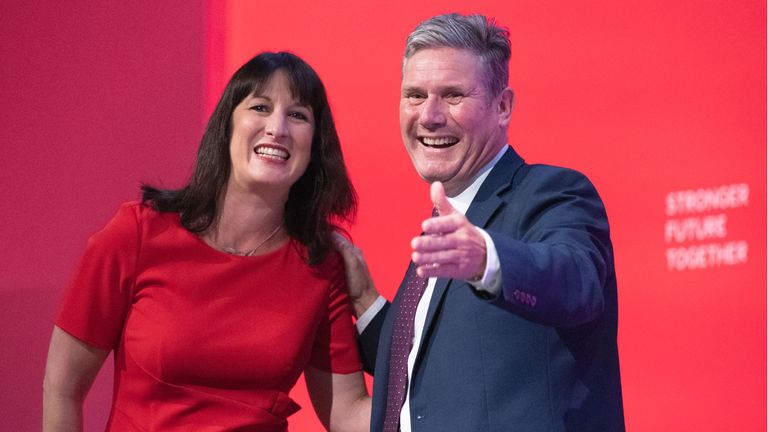Keir Starmer has repeated his party’s intentions to speed up de-carbonising Britain’s power generation by 2030, and to ‘build towards’ annual £28 billion of green spending by a Labour government.
Delivering a major policy briefing yesterday in Bristol at the start of a probable election year, the Labour leader sought to allay doubts about the extent of the party’s green ambitions.
In recent weeks Labour figures including shadow Chancellor Rachel Reeves – pictured with Starmer – have rowed back from the £28 billion figure, which the party had first presented as an allocation made each and every year of a Labour government.
Conservative ministers have poured scorn on that formulation, saying it could only funded through big tax rises or increased public borrowing.
Starmer yesterday confirmed Labour’s scaling back of the notion, echoing Reeves’ framing of the figure as a goal to be sought as the economy recovers.
In a wide-ranging speech, Starmer stood by what he called the party’s ‘unapologetically ambitious’ targets for government, including
- adopting clean power technologies tasked to strip carbon from networks by 2030,
- launching GB Energy as a nationalised power developer, and
- pushing Britain’s economic growth to bee the fastest among the G7.
As a new public company, said Starmer, the low carbon developer GB Energy would “deliver cheaper bills.. using clean British power, not foreign oil and gas”.
The leader declared: “There is no question of pushing back on the mission – the mission is clean power by 2030”.
Labour’s new plan would, he promised, offer “a total overhaul in how we approach the economy and government”.
Presenting that new approach as “Mission Government”, Starmer repeated Labour’s commitment to existing cross-party Net Zero pledges.
Questioned by journalists about Labour’s £28 billion “Green Prosperity Plan”, Starmer said its existence would stimulates projects funded by private capital investment, and at an intended ratio of three to one.
The plan would be funded in part by borrowing, he confirmed, and would be ramped up from an initial sum over the life of a Labour government’s first Parliament.
“We’ve looked very carefully at the investment that’s needesd”, Starmer went on. “The investment that we want to put in intended to trigger private investment at a ratio of one to three.
“We’ve had quite extensive discussions with global investors as to how that will work. And the date on which a cheque is written by the government is not the date the mission is delivered – the date the mission is delivered is 2030. That’s the mission.”
Precise levels of green investment would depend, Starmer conceded, on current government spending and fiscal rules for borrowing.
“Obviously we pushed back the ramping up to £28bn,” Starmer said. “It doesn’t mean there’s nothing before that; it means it’s ramped up to £28bn, subject of course to money the government may already be putting in, and to our fiscal rules. But that is just sensible investment.”
Counting toward Labour’s intended pot of environmental investments, the leader made clear, will green funding already pledged by Conservative administrations. These include £6 billion recently granted for energy efficiency programmes run for three years from 2025.
“We’re trying not just to defeat the Tories”, he declared, “but to defeat their entire way of doing politics, a mindset that seeks out any differences between the people of this country, and, like weeds between the paving stones, will pull apart the cracks, so ultimately, they can divide and rule.”




